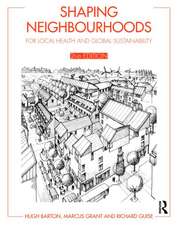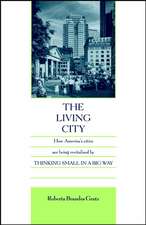Urban Planning in Sub-Saharan Africa: Colonial and Post-Colonial Planning Cultures
Autor Carlos Nunes Silvaen Limba Engleză Hardback – 14 ian 2015
The book examines the rich variety of planning cultures in Africa, offers a unique view on the introduction and development of urban planning in Sub-Saharan Africa, and makes a significant contribution against the tendency to over-generalize Africa’s urban problems and Africa’s urban planning practices. Urban Planning in Sub-Saharan Africa is written for postgraduate students and advanced undergraduates, researchers, planners and other policy makers in the multidisciplinary field of Urban Planning, in particular for those working in Spatial Planning, Architecture, Geography, and History.
| Toate formatele și edițiile | Preț | Express |
|---|---|---|
| Paperback (1) | 477.07 lei 43-57 zile | |
| Taylor & Francis – 26 ian 2015 | 477.07 lei 43-57 zile | |
| Hardback (1) | 1277.27 lei 43-57 zile | |
| Taylor & Francis – 14 ian 2015 | 1277.27 lei 43-57 zile |
Preț: 1277.27 lei
Preț vechi: 1557.65 lei
-18% Nou
Puncte Express: 1916
Preț estimativ în valută:
244.40€ • 255.86$ • 202.23£
244.40€ • 255.86$ • 202.23£
Carte tipărită la comandă
Livrare economică 07-21 aprilie
Preluare comenzi: 021 569.72.76
Specificații
ISBN-13: 9780415632294
ISBN-10: 0415632293
Pagini: 328
Ilustrații: 4 tables, 45 halftones and 45 line drawings
Dimensiuni: 156 x 234 x 23 mm
Greutate: 0.59 kg
Ediția:1
Editura: Taylor & Francis
Colecția Routledge
Locul publicării:Oxford, United Kingdom
ISBN-10: 0415632293
Pagini: 328
Ilustrații: 4 tables, 45 halftones and 45 line drawings
Dimensiuni: 156 x 234 x 23 mm
Greutate: 0.59 kg
Ediția:1
Editura: Taylor & Francis
Colecția Routledge
Locul publicării:Oxford, United Kingdom
Public țintă
Postgraduate and UndergraduateCuprins
Chapter 1: Introduction Chapter 2: Urban Planning in Sub-Saharan Africa: an Overview Chapter 3: The IFHTP Discourse on Urbanism in Colonial Africa between the Wars Chapter 4: Colonial Urban Planning in Anglophone Africa Chapter 5: Colonial Planning Concept and Postcolonial Realities. The Influence of British Planning Culture in Tanzania, South Africa and Ghana Chapter 6: French Colonial Urbanism in Africa Chapter 7: The Grid Plan in the History of Senegalese Urban Design Chapter 8: Architecture and Town Planning in Italian East Africa during the years of the Empire (1936-1941) Chapter 9: Colonial Cities at the Crossroads: Italy and Ethiopia Chapter 10: The German Variation. A Sketch of Colonial Städtebau in Africa, 1884-1919 Chapter 11: Crossed Colonization. Housing Development in Urban Peripheries. The Hispanic-African Colonial Territories, 1912 – 1976 – 2013 Chapter 12: Kinshasa’s Syndrome-Planning in Historical Perspective: from Belgian Colonial Capital to self- constructed Megalopolis Chapter 13: Influence of Croatian Urban Planners in Postcolonial Africa. Urban Development Plan of Conakry, Guinea, 1963 Chapter 14: Reflections on Some Aspects of Town-Building at the Cape of Good Hope, South Africa, During the 1800s of Relevance to Today Chapter 15: Valuing Possibility: South-South Cooperation and Participatory Budgeting in Maputo, Mozambique Chapter 16: The Developmentalist Origins and Evolution of Planning Education in Sub-Saharan Africa, c1940 to 2010
Recenzii
"This book is an important addition to African planning scholarship, recognizing the interface between urban planning practices shaped by context as well as imported ideas." - Vanessa Watson, Deputy Dean, Faculty of Engineering and the Built Environment, University of Cape Town
"We are increasingly familiar with the problems that demographic growth, inequality, spatial dualism and post-colonial adjustment pose for cities in the developing world. Few studies, however, have fully got to grips with the sheer diversity of challenges that planners in such cities face. This book breaks new ground by offering comparative analysis of past, present and emerging planning practices across a swathe of sub-Saharan Africa. Packed with incisive case-studies and penetrating critique, it is required reading for anyone interested in the realities of planning cities in the Global South." - John Gold, Professor of Urban Historical Geography, Oxford Brookes University
"We are increasingly familiar with the problems that demographic growth, inequality, spatial dualism and post-colonial adjustment pose for cities in the developing world. Few studies, however, have fully got to grips with the sheer diversity of challenges that planners in such cities face. This book breaks new ground by offering comparative analysis of past, present and emerging planning practices across a swathe of sub-Saharan Africa. Packed with incisive case-studies and penetrating critique, it is required reading for anyone interested in the realities of planning cities in the Global South." - John Gold, Professor of Urban Historical Geography, Oxford Brookes University
Descriere
This book provides a research based and critical view of urban planning cultures in Sub-Saharan Africa during the colonial and post-colonial periods and identifies these influences on planning practices. It looks at planning as being strongly rooted in a particular culture based on the different planning systems, institutional arrangements, prevailing urban paradigms, legal traditions, political practices, and other cultural traits that all come into play.




















